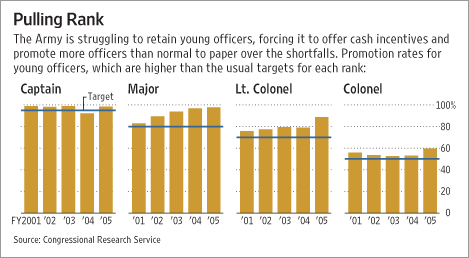Army Effort to Retain Captains Falls Short of Goal
WSJBy YOCHI J. DREAZEN
January 26, 2008
WASHINGTON -- An expensive Army effort to retain young officers with big cash bonuses has fallen short of its target, underscoring the military's continuing struggle to recruit and keep troops.
The program persuaded 11,933 captains to commit to additional Army service, short of the 14,184 goal. The military will pay out more than $349 million in bonuses to the officers who took the incentives.
All told, 67.6% of those eligible for the program -- which offered officers cash bonuses of as much as $35,000, the ability to choose their next assignment or military-funded graduate school -- agreed to serve an additional one to three years in the Army. The military had hoped that 80.5% of the eligible captains would extend their time in the Army.
The shortfall shows how difficult it is for the Army to keep young soldiers worn down by multiple tours in Iraq and Afghanistan, a problem fueling the debate over whether the Bush administration has pushed the military to the breaking point.
Senior Army officials acknowledge that the retention program missed its goal but credit the incentives with helping to avert a much larger manpower crisis. The Army is hoping to add tens of thousands of soldiers by 2010, including thousands of new captains.
"It looks like we about broke even," Gen. George Casey, the Army's chief of staff, said in an interview. "The feedback I got from the field was that a lot of guys took it that would have stayed in, anyway, but the captains felt like they had choices, and they liked it."
To make its numbers, the Army has had to repeatedly lower its eligibility standards, allowing in a larger number of recruits who lack high-school diplomas, are out-of-shape or have criminal records. Those measures allowed the Army to narrowly exceed its overall 80,000 recruiting goal for fiscal-year 2007, enlisting 80,407 would-be soldiers.
But the captain shortfall poses a unique set of challenges for the Army and concerns Gen. Casey and other senior military officials.
In Iraq, captains -- who have usually served multiple tours in Iraq -- are crucial to the counterinsurgency strategy that military commanders credit with a sharp and sustained decline in the country's violence.
With more troops at his disposal because of last year's surge strategy, Gen. David Petraeus, the top commander there, pushed small units of soldiers, generally led by captains, off of larger bases and out into Iraqi neighborhoods. In many parts of the country, those captains then brokered local cease-fires and persuaded Sunni tribesmen to join the fight against al-Qaeda in Iraq, developments credited with sharply reducing Iraq's bloodshed.
Large numbers of captains also serve on the military training teams that live alongside, and mentor, the fledgling Iraqi army. That means that captains are essential to the eventual U.S. exit strategy from Iraq, which depends on standing up an Iraqi military capable of defending the country on its own.
But the military's heavy reliance on captains comes at an enormous cost. Many captains -- generally in their late 20s or early 30s -- have done two, three and in some cases four tours in Iraq or Afghanistan.
On trips to the war zones, it is common to meet captains who have young children they have never met or ex-wives who left after growing tired of waiting for the soldiers to return home.
The military has been forced to try two separate approaches for minimizing the shortfall. In addition to the cash bonuses and other incentives, the Army is promoting far more officers than normal, which means that virtually all lieutenants are assured of making captain and that virtually all captains are assured of making major. A July 2006 study by the Congressional Research Service noted that the "unusually high" promotion rates "have already raised some concerns regarding the quality of the officers being selected" for advancement.
"The Army must increase company-grade officer retention to keep up with the growth," said Paul Boyce, an Army spokesman. "We must reduce the rate of captains departing long term if we are to sustain the growth needed to meet future requirements."

Write to Yochi J. Dreazen at yochi.dreazen@wsj.com
